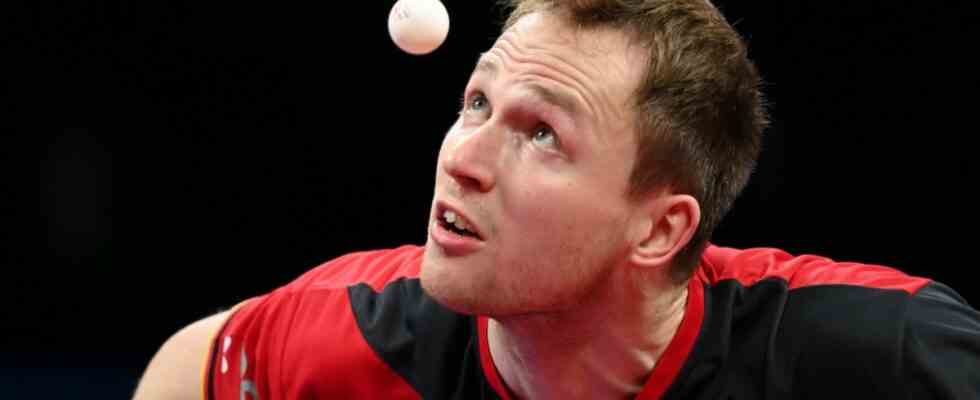Sathiyan Gnanasekaran from Chennai in southern India almost dealt a heavy blow to German table tennis last week. In the second group game at the World Cup in China, the 29-year-old defeated both top German players in Dang Qiu and Benedikt Duda, which is why Germany surprisingly lost 3-1 to India and threatened to be eliminated in the group stage. That would be as if German footballers would not survive the preliminary round at a World Cup.
The name Sathiyan Gnanasekaran with each of its 20 letters would probably have burned itself into the German table tennis memory if the German team had also lost against strong French and had been eliminated early. It would also have been irrelevant that the German men had to compete with the second guard at this World Cup: with Dang Qiu, Benedikt Duda, Kay Stumper and Ricardo Walther and without the top players Dimitrij Ovtcharov, Timo Boll and Patrick Franziska, who were behind in training.
“Final Sunday, and Germany is still in it – that’s crazy,” said national coach Roßkopf
But the German B team turned out to be an absolute A solution. Duda, Qiu and Stumper defeated France, Uzbekistan and Croatia after the India embarrassment, turned a 2-0 deficit into a 3-2 win against France again in the quarter-finals and also won with strong nerves in the semi-finals against South Korea 3:2 As a result, they unexpectedly found themselves in the final against China on Sunday.
Qiu, Duda and Stumper, numbered 9, 36 and 103 in the world rankings, faced the world’s two best players, Fan Zhendong and Ma Long, among others. For this reason it was neither a surprise nor a disappointment that they lost the final 0:3. Maybe it was a bit disappointing that they only got a single set. German table tennis players have never won against China, even with Boll and Ovtcharov. National coach Jörg Roßkopf put it this way: “Final Sunday at the World Cup, and Germany is still in it – that’s crazy!”
The women are happy with bronze – but there was even more in the semifinals
Silver for the men and bronze for the women meant an excellent German World Cup record. With five wins in a row, Han Ying, Shan Xiaona, Nina Mittelham and Sabine Winter made it into the semi-finals against Japan, where they clearly lost 3-0, but only lost two singles in the fifth set and by just two points. “Basically, we’re very happy with the bronze,” said Mittelham. “But if you see how the semifinals went, we would have liked to have made it to the final.” Nevertheless, she summed up forgivingly: “We had made a medal – and we made it.”
The men’s final luck lasted just 80 minutes on Sunday. They consoled themselves with the fact that only a very exclusive circle of nations ever gets such a final date with the demigods in red. Duda, 28, from the Bergneustadt Bundesliga club had nerved of nerves to score the winning third point in the quarterfinals against France and in the semifinals against South Korea. In the final he had no chance against the individual world champion Fan Zhendong and lost in three sets (-8/-8/- 9). Then the current European champion Dang Qiu, 25, from the champions Borussia Düsseldorf took on the Olympic champion Ma Long and lost in four sets (-9/-6/9/-1). 19-year-old Kay Stumper from Düsseldorf lost in three sets against Wang Chuqin (-7/-8/-4).
For the seventh time in 15 years, a German men’s team was in a final against China. For the seventh time there was a defeat. At the 2008 Olympics in Beijing, Boll, Ovtcharov and Süss lost. Germany was also clearly defeated at the World Championships in 2010 in Moscow (Boll, Ovtcharov, Süss), 2012 in Dortmund (Boll, Ovtcharov, Baum), 2014 in Tokyo (Boll, Ovtcharov, Franziska) and 2018 in Sweden (Boll, Franziska, Filus). . Most recently, Boll, Ovtcharov and Franziska lost the final at the 2021 Olympics in Tokyo. Reaching a final against China is pretty much the ultimate in table tennis today. Silver is gold here.
Even before the tournament started, the national coach had defiantly defended that his B team would also be able to achieve this in Chengdu. Roßkopf, 53, is a professional optimist. “I always believe in maximum success,” he said before the World Cup. “We’ll try it – why not?” Sometimes success begins with a simple question.

